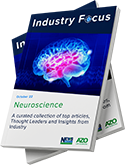An Early Alzheimer’s Disease Detection Sensor
Click here to view original web page at An Early Alzheimer’s Disease Detection Sensor Summary: A newly developed biosensor that detects TNF alpha in the body could be used to screen for Alzheimer’s and other diseases. Source: Simon Fraser University Researchers with the SFU Nanodevice Fabrication Group are developing a new biosensor that can be … Continue reading “An Early Alzheimer’s Disease Detection Sensor”









